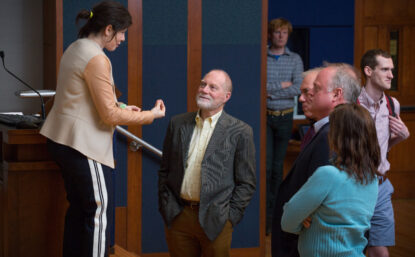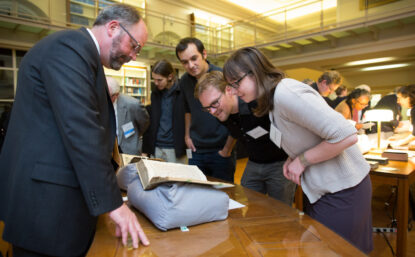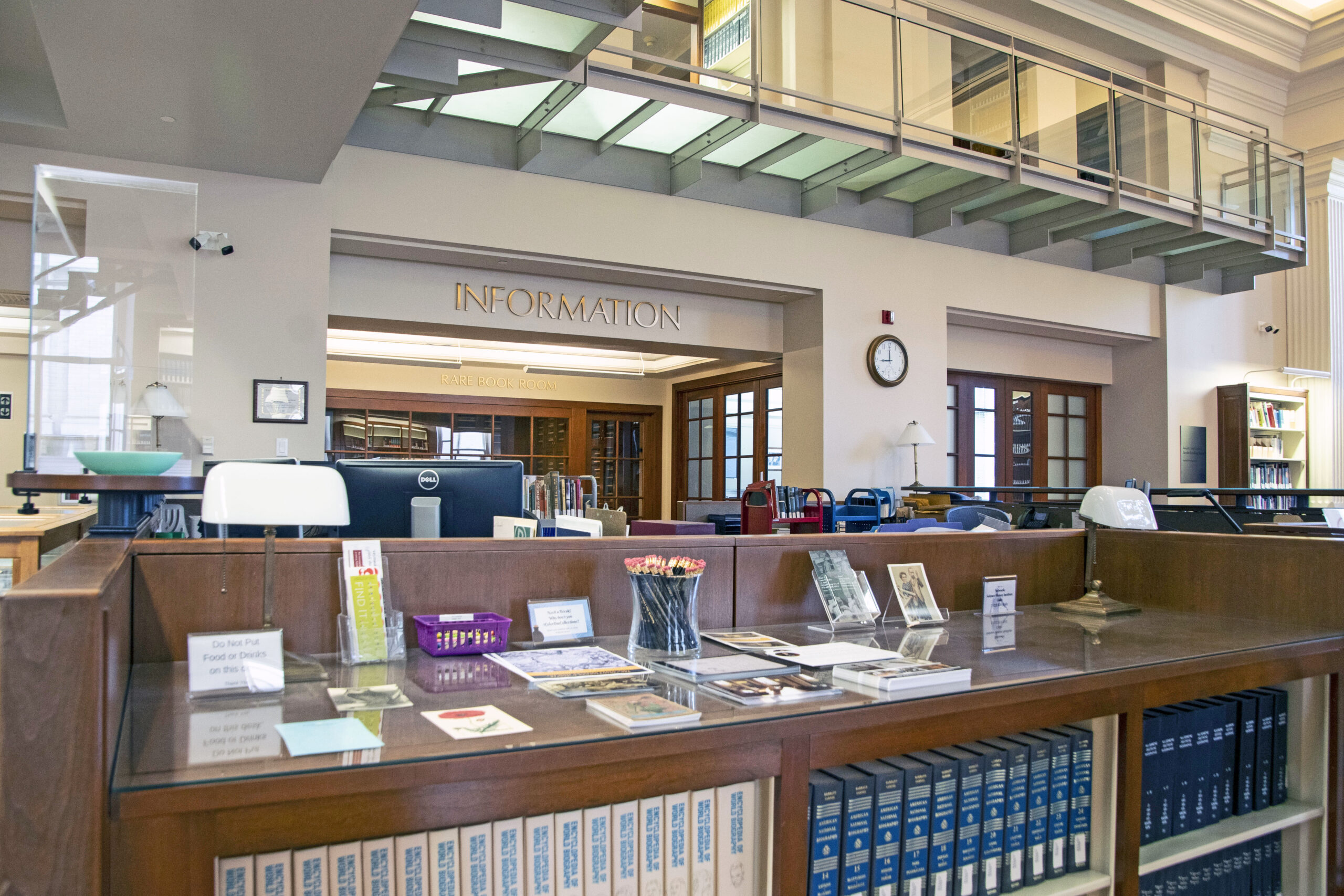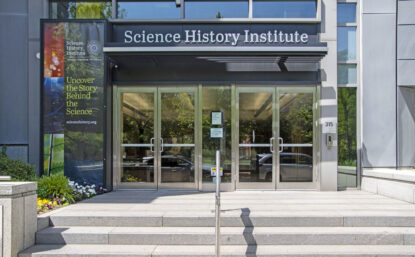Application Guide
Optimize your Beckman Center fellowship application with this guide to the application process and selection criteria.
Jump to
Curatorial Fellowships
Curatorial fellowships are awarded through a separate hiring process and are not included in this guide. Information will be available each fall on our Available Fellowships page.
Eligibility of Candidates
The eligibility of candidates varies according to the fellowship. Candidates may apply for both the curatorial fellowship and the postdoctoral research fellowship. Applicants for postdoctoral and dissertation research fellowships may opt to be considered for short-term fellowships, and applicants for four-month short-term fellowships may opt to be considered for distinguished fellowships. You may not hold multiple fellowships in the same academic year, but prior year fellowships do not affect eligibility for future awards. If you are unsure about what kind of fellowship to apply for, please write to us at fellowships@sciencehistory.org and we will advise you.
- Postdoctoral Research Fellowships
Open to scholars who are on track to have defended the dissertation by the end of July 2026. - Dissertation Fellowships
Open to graduate students whose doctoral dissertation proposals have been accepted by the applicants’ university departments. - Distinguished Fellowships
Open to distinguished scholars whose research in the history of chemical or molecular science, broadly construed, would benefit from access to our collections. Eligibility extends to academics at the rank of senior lecturer or above, established scholars in independent research libraries or museums, and independent scholars with a commensurate record of scholarly achievement. These fellowships must be taken up for a continuous four-month period between July and the following June. - Short-Term Fellowships
Open to all scholars and other researchers, irrespective of career stage or educational credentials, who plan to work closely with the Institute’s collections on an independent research project.
It is possible that some conditions can be waived if, for example, you have had a career break or illness. In cases such as these, we invite you to write to fellowships@sciencehistory.org for advice prior to applying.
Collections
The focus of the Institute’s primary collections is the history of chemistry, chemical engineering, and the modern life sciences. Our materials range chronologically from the 15th century to the present and include more than 7,000 rare books, significant archival holdings, thousands of images and other graphic materials, memorabilia of various kinds, oral histories, scientific instruments and artifacts, and a substantial fine art collection, supported by over 100,000 modern primary-source volumes and journals.
Within the collections there are many areas of special strength of interest to historians of art, business and labor, and the environment, as well as historians of science, technology, and medicine and scholars in science and technology studies.
Our collection strengths include
- Corporate Records
We possess the corporate records of chemical companies and senior business and scientific figures within them. These include the historical collections of the Dow Chemical Company, Rohm & Haas, the Aldrich Chemical Company, and Arnold O. Beckman and Beckman Coulter, Inc. - Scientific Organizations
Our archives hold the records of major international scientific organizations such as the American Chemical Society, the American Institute of Chemists, The Chemists’ Club, and the International Union of Pure and Applied Chemistry. We also hold the records of the Gordon Research Conferences. - Immigration and Exile
Our oral history collection documents scientists’ experiences throughout the 20th century as they fled Cuba, Hungary, South Africa, China, Turkey, and Germany. Archival collections include the papers of Gabor Levy, Ernest Ludwig Eliel, and most recently Georg Bredig and his son Max. - Food Science
We possess substantial collections documenting and analyzing the production, packaging, and marketing of food, including advertisements, printed ephemera, recipe books, and photographs. Subjects represented in the collection include food additives and adulteration, flavoring essences, and safety standards, as well as food-adjacent topics such as sugar, MSG, and margarine. - Information Science
We hold the papers, oral history, and extensive works of Eugene Garfield, as well as oral histories of several early information scientists and historical materials, including punch cards, card punching equipment, and documentation of the patenting of LCDs. - Materials Science
The Othmer Library holds substantial resources on materials science topics across six centuries, including inorganic and organic chemistry, mineralogy, mining and metallurgy, geochemistry, and astrochemistry. - Modern Bioscience and Medicine
Our library and archives have broad primary and secondary source collections covering molecular biology, biochemistry, biotechnology, physiology, pharmacology, toxicology, balneology, and agriculture. - Women in Science
In addition to a range of materials related to prominent female chemists (listed under Chemists below), our collections also include oral histories of women in the chemical industry, images of women working in a variety of laboratory and industrial settings, 19th- and 20th-century women’s laboratory and lecture notes, and numerous historical materials and objects related to women’s health. - Chemists
Our Archives hold the papers of numerous notable polymer chemists, such as Carl Marvel, Daniel W. Fox, and the Nobel laureate Paul Flory. Other Nobel laureates in the archival collection include Sir John Pople, Alan MacDiarmid, Paul Lauterbur, John Fenn, Robert Bruce Merrifield, Johann Deisenhofer, and Richard Smalley. Additionally, our library collections contain a range of materials related to prominent female chemists including Marie Curie, Irène Joliot-Curie, Bettye Washington Greene, Dorothy Crowfoot Hodgkin, Stephanie Kwolek, and Rosalyn Yalow. - Alchemy
Our world-class rare books collection includes hundreds of manuscripts and published sources relating to the Renaissance and early modern alchemy, as well as books of secrets. - Fine Art
Our fine art collection contains more than 500 works of art, including oil paintings and portraits, prints, sculpture, multimedia works, and nontraditional media. - Color
The practical applications of materials science in the world of color are well represented across our collections, including home and industrial dyes and dyeing, pigments, enamels, gunpowder and pyrotechnics, and color theory. - Science Education
Pedagogical materials in our scientific instrument collections include chemistry sets, molecular models, and science kits used for both instruction and play, primarily from the mid-20th century. Related archival documents include lecture notes, such as Louis Pasteur’s on stereochemistry, as well as letters between scientists concerning the state of scientific education. Our library also holds an extensive collection of scientific textbooks.
More information about our collections can be found at sciencehistory.org/collections. The library, rare book, and archival collections can be searched at othmerlib.sciencehistory.org and archives.sciencehistory.org, our museum object collection at sciencehistory.pastperfectonline.com, and the digitized collections at digital.sciencehistory.org. For information on our museum holdings please submit a reference request.
Review Process and Criteria
All short-term, distinguished, dissertation, and postdoctoral research fellows are selected by an independent review committee consisting of an international panel of leading scholars. Its members are chosen to represent a diversity of academic and research institutions as well as subject area specialties and historiographical approaches.
The committee will draw up a ranked shortlist of candidates for each type of fellowship, and the associate director of the Beckman Center for the History of Chemistry will then match this selection to the available named fellowships according to the terms of our endowments and available named fellowships. Candidates do not need to select from among these named fellowships themselves. The committee may also recommend the awarding of short-term fellowships to dissertation, postdoctoral, and distinguished fellowship candidates.
The main criteria for selection are as follows:
- Scholarly Achievement and Potential
The panel will base this assessment mainly on the clarity, insightfulness, and originality of your scholarly project(s) as displayed in your cover letter and research proposal, reference letters, and your publication record. - Collections Usage
The extent to which the project draws upon the Institute’s collections, whether rare books, archives, modern materials, or museum artifacts. Candidates can also make a case that they would derive exceptional benefit from our secondary sources.
Another important factor in the selection of long-term fellows is the feasibility of realizing the stated goals set by the end of the fellowship, which the panel determines by scrutinizing the objectives you set as part of your research proposal.
Preparing Your Application
To apply for a Beckman Center fellowship, you will need to use the appropriate online form and submit the following documents:
Cover Letter
Your cover letter, apart from introducing you and your project(s), should explain why the Science History Institute is a suitable host institution. A maximum of two pages is accepted for the cover letters of long-term fellowship applicants, and one page for short-term fellowships.
Research Proposal
Your research proposal should incorporate the following elements:
- a detailed description of your research project, its scholarly rationale, and your research objectives during the fellowship.
- an account of how your research project would draw upon the Institute’s collections.
A maximum of four pages is accepted for the research proposals of long-term fellowship applicants, and three pages for short-term fellowships.
Additional Supporting Information
The remaining elements of your application consist of
- an abstract of up to 150 words
- CV (four pages max)
- fellowships of nine months or more: one piece of sample work (e.g. a published paper, dissertation chapter, or master’s thesis), preferably of not more than 10,000 words
- a personal statement of up to 150 words
- contact details of two referees unaffiliated with the Science History Institute
Further advice can be found in the FAQs.
Sample Application Timeline
| Application Deadline | January 15 |
| Deadline for upload of referee letters | January 31 |
| Meeting of review committee | March |
| Candidates notified of decisions | April 15 |
You will receive an email from us on at least three occasions during this process:
- To confirm that your application materials were uploaded successfully (usually immediate)
- To confirm that your two reference letters have been uploaded successfully
- To notify you of the outcome
We will also contact you if we anticipate any delays, if we need further information concerning your eligibility, or if your referees have not uploaded their letters by the deadline.
The information contained in this guide was last updated on September 30, 2025.

Available Opportunities
Peruse Beckman Center short- and long-term residential fellowships and travel grants.

How to Apply
Access application forms and instructions for our fellowships and library travel grants.

Meet the Fellows
Our scholars study a range of topics in the history and social studies of chemistry, chemical engineering, and the life sciences.

About Our Collections
At the Institute, we preserve historical materials related to scientific achievements from around the world.

Frequently Asked Questions
Get answers to common questions, including international visas and daily life at the Institute.

Named Fellowships
Learn about our named fellowships, their recipients, and the generous gifts that made them possible.
